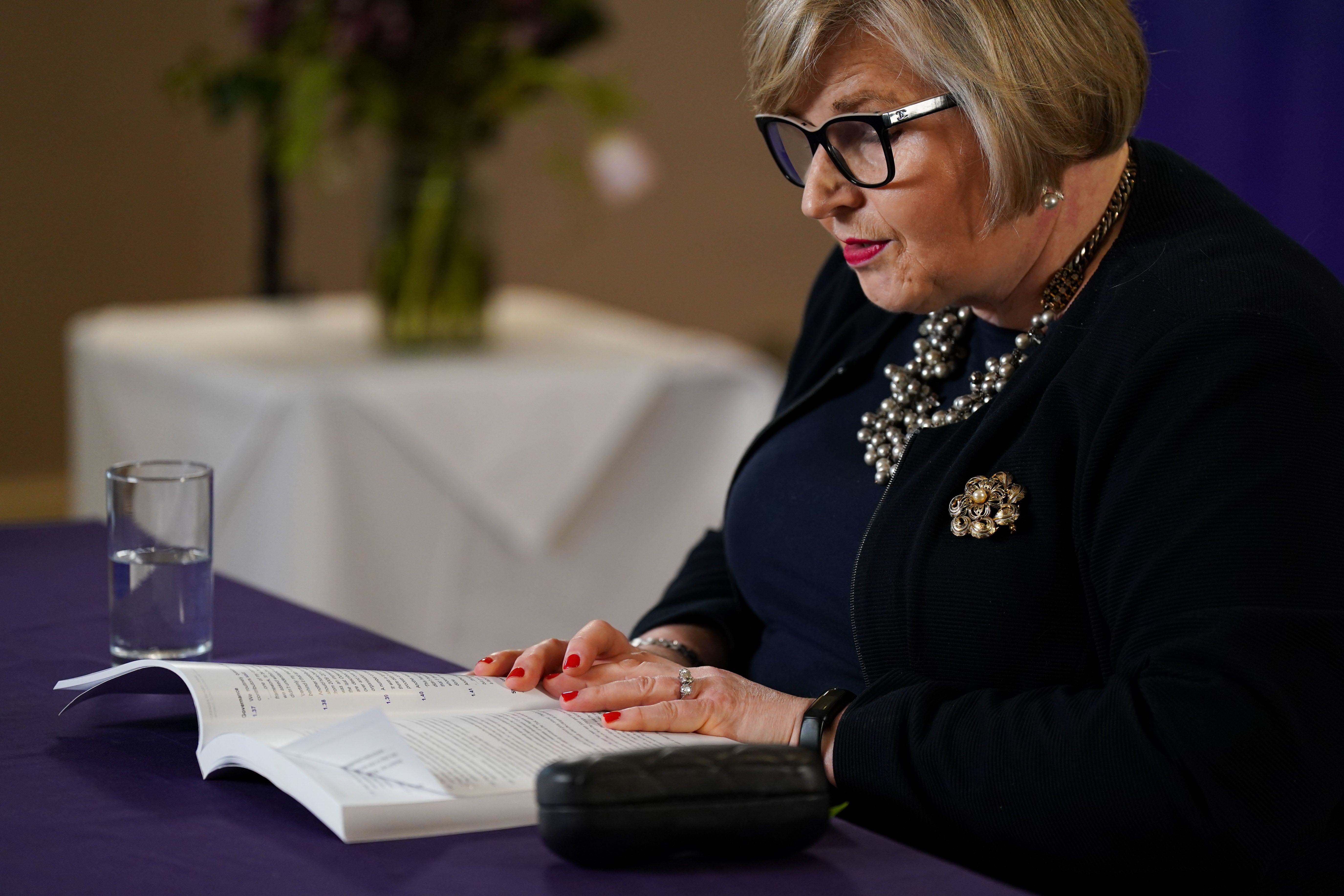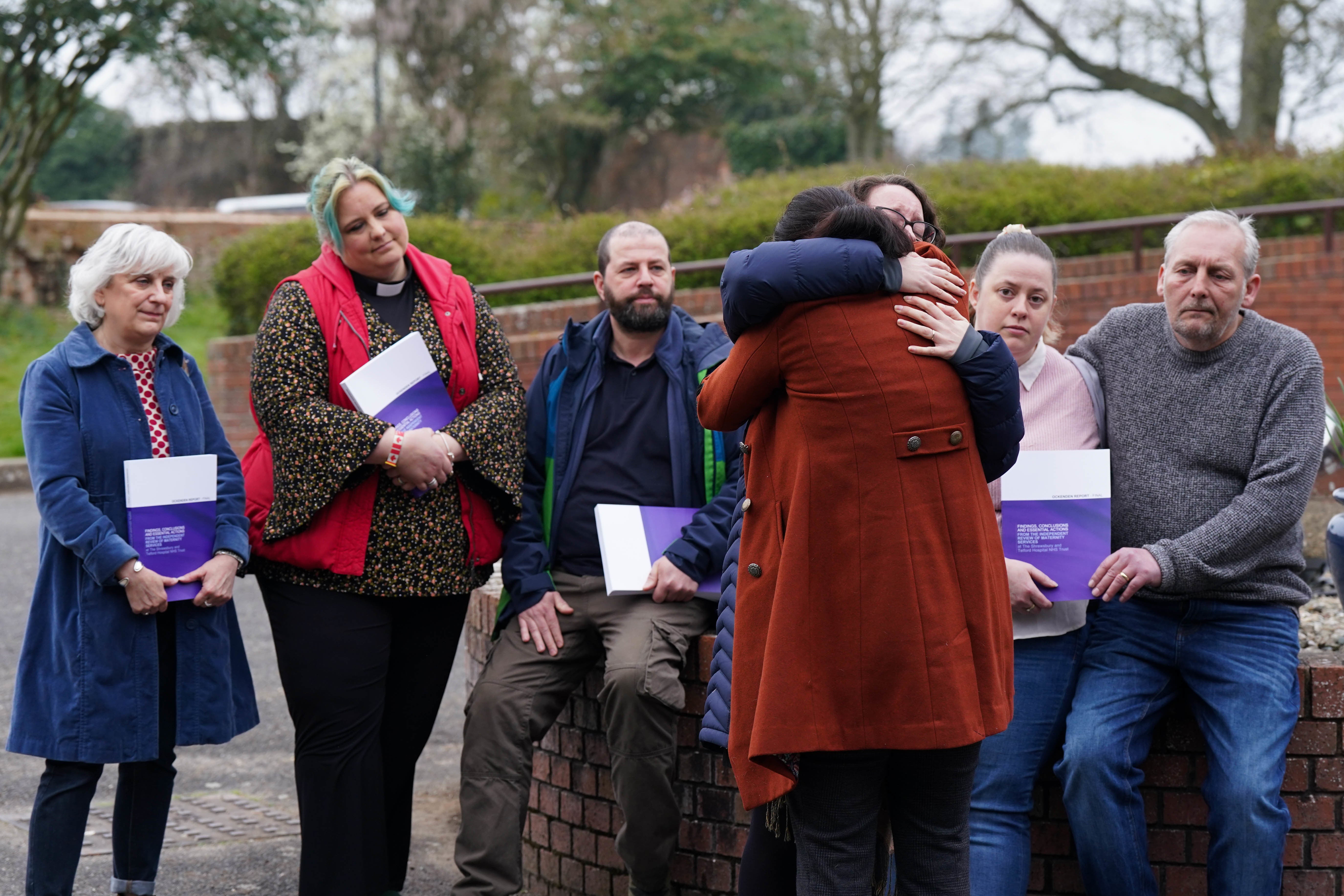Shrewsbury maternity inquiry: ‘Cruelty beyond comprehension’ as mothers blamed for babies’ deaths
Donna Ockenden warns of ongoing care failings at Shrewsbury as staff told her they still fear speaking out
Your support helps us to tell the story
From reproductive rights to climate change to Big Tech, The Independent is on the ground when the story is developing. Whether it's investigating the financials of Elon Musk's pro-Trump PAC or producing our latest documentary, 'The A Word', which shines a light on the American women fighting for reproductive rights, we know how important it is to parse out the facts from the messaging.
At such a critical moment in US history, we need reporters on the ground. Your donation allows us to keep sending journalists to speak to both sides of the story.
The Independent is trusted by Americans across the entire political spectrum. And unlike many other quality news outlets, we choose not to lock Americans out of our reporting and analysis with paywalls. We believe quality journalism should be available to everyone, paid for by those who can afford it.
Your support makes all the difference.Mothers were blamed for their babies’ deaths while fatal issues with care went ignored over decades, a damning report into the biggest maternity scandal in the NHS has concluded.
The review into failings at Shrewsbury and Telford Hospital Trust found that 300 babies had died or suffered a brain injury as a result of poor care.
Maternity expert Donna Ockenden, who led the inquiry, warned that poor treatment was still an issue at the trust despite calling for immediate action to be carried out after the initial findings in 2020.
Systemic issues at the trust were highlighted by Ms Ockendenas as long ago as November 2019 in her interim report, revealed by The Independent. But she said maternity staff had told her they still had concerns over the level of care today.
Families said they suffered “cruelty beyond comprehension” as their concerns were not addressed and some deaths were not investigated.
Health secretary Sajid Javid told the Commons on Wednesday that in one case important clinical information had been kept on Post-it notes, which were then binned by cleaners.
The investigation into 1,486 families’ cases, which began in 2017, found:
- The trust “laid blame” on families following the deaths of their children
- Failures in care were repeated from one incident to the next
- Traumatic forceps deliveries caused skull fractures, broken bones or development of cerebral palsy in babies
- External bodies failed to hold the trust to account, and internally the trust did not learn from reviews
- Babies died after women were denied caesareans because of a culture that desired natural births
Ms Ockenden, chair of the review, told The Independent said she’d had staff as recently as Tuesday reach out to say they were “frightened to speak out” and “fearful of their job”.
The chair made clear there were ongoing concerns over care at the trusts despite an initial review in 2020 calling for actions to improve.
Ms Ockenden said it was “astounding” that for more than two decades the failings had not been challenged internally by the trust and that external healthcare bodies did not hold it to account.
She made clear there were ongoing concerns over care at the trust despite an initial review in 2020 demanding improvements and also warned the failures at Shrewsbury could “potentially be replicated elsewhere” outside of maternity services.

Investigations into cases revealed more than 200 avoidable deaths, including 131 stillbirths and 70 neonatal deaths. There were a further 29 cases of severe brain damage and 65 cases of cerebral palsy. Nine women were also found to have died following mistakes.
Parents failed by the trust told The Independent they suffered “inhumanity” and “cruelty beyond comprehension” as they were blamed for the deaths of their babies.
The families say they weren’t listened to and called for an independent board to scrutinise hospitals’ implementation of the recommendations.
Health secretary Sajid Javid said the report was a “devastating account of bedrooms that are empty, families that are bereft and loved ones taken before their time”.
Mr Javid said actions set out by Ms Ockenden would be accepted and offered reassurances that the individuals who were responsible for the “serious and repeated failures” will be held to account.
The Ockenden review was first commissioned by former health secretary Jeremy Hunt in 2017 and originally covered 23 families.
In 2019 The Independent revealed initial findings of the review had identified more than a dozen women and more than 40 babies died during childbirth.
The review has multiple reports from parents who said women were “blamed” or “held responsible” after women and babies were harmed or died.

Richard Stanton and Rhiannon Davies, whose daughter Kate died in March 2009, have been one of the key families leading the campaign for justice.
According to the final Ockenden report two babies died in similar circumstances within the year prior to Kate’s death.
Rhiannon Davies said there should be an independent whistleblowing line for staff to speak out and a panel to review each year’s progress against the Ockenden report recommendations.
Kayleigh and Colin Griffiths, who have also been at the forefront of the review, lost their daughter Pippa in 2016.
Speaking with The Independent they said: “We weren’t listened to and weren’t listened to by the trust, and they keep telling us that they’ve learned and today has shown us that even though they’re telling us they’ve implemented all the actions and staff are still coming forward. They haven’t learned and until they do that we’re not going to be satisfied.”
Despite warnings from the review chair of ongoing problems and that it had not implemented all previous recommendations, the trust’s chief executive Louise Barnett said on Wednesday it had delivered all of the actions asked of it following the 2020 interim report.
“We know that we still have much more to do to ensure we deliver the highest possible standard of care to the women and families we care for.”
Former health secretary Jeremy Hunt said that because “culture of fear in the NHS” it has been left to the families to fight for justice.
Mr Hunt told the Commons: “Today’s report goes beyond my darkest fears when I commissioned it as health secretary in 2016.”
The final Ockenden review identifies at least eight regulators and external healthcare bodies investigated or highlighted concerns about care at Shrewsbury and Telford Hospitals Trust over 20 years.
In 2021 senior NHS commissioning staff told reviewers they were aware of issues within the service from 2013 to 2020 but were assured by the trust of changes and told they were “limited in their power to change things for the better”.
Healthwatch England, whose chair Sir Robert Francis led the public inquiry into failings at Mid Staffordshire, said the Ockenden report was “another scandal where it’s clear that lessons from past failures haven’t been learnt.”
The body’s national director Louise Ansari added: “We also know the problems in maternity care don’t stop at Shrewsbury hospital, with investigations into failures to provide safe care to mothers and babies being recently carried out in other parts of the country.”

Join our commenting forum
Join thought-provoking conversations, follow other Independent readers and see their replies
Comments